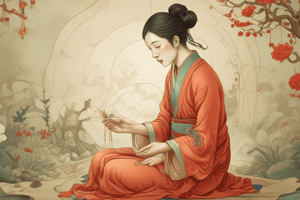Podcast
Questions and Answers
What is the primary role of the bladder in body fluid transformation?
What is the primary role of the bladder in body fluid transformation?
- It regulates the temperature of body fluids.
- It directly creates new body fluids from nutrients.
- It absorbs excess fluids from the body.
- It separates received fluids into pure and impure parts. (correct)
Which organ is responsible for the transportation and transformation of body fluids?
Which organ is responsible for the transportation and transformation of body fluids?
- Lungs
- Spleen (correct)
- Bladder
- Kidneys
How do the lungs contribute to the regulation of body fluids?
How do the lungs contribute to the regulation of body fluids?
- By directly eliminating excess fluids from the body.
- By absorbing fluids from the skin.
- By dispersing pure fluids and sending them to the kidneys. (correct)
- By producing new fluids from air.
What effect does the loss of body fluids have on Qi?
What effect does the loss of body fluids have on Qi?
What can result from a deficiency of body fluids?
What can result from a deficiency of body fluids?
What is the function of Zong Qi in the human body?
What is the function of Zong Qi in the human body?
Where is Yuan Qi primarily stored in the body?
Where is Yuan Qi primarily stored in the body?
Which type of Qi is involved in protecting the body against external threats?
Which type of Qi is involved in protecting the body against external threats?
What does Ying Qi primarily do in the body?
What does Ying Qi primarily do in the body?
What does the concept of 'San Jiao' refer to?
What does the concept of 'San Jiao' refer to?
Which type of Qi is formed by a combination of clean Qi and food essence Qi?
Which type of Qi is formed by a combination of clean Qi and food essence Qi?
What is the main role of Wei Qi concerning skin and body temperature?
What is the main role of Wei Qi concerning skin and body temperature?
True or False: The more abundant the Yuan Qi, the weaker the functional activities of the Zang-fu organs.
True or False: The more abundant the Yuan Qi, the weaker the functional activities of the Zang-fu organs.
What is the primary role of Qi in the human body?
What is the primary role of Qi in the human body?
Which organs are primarily involved in the production and regulation of blood?
Which organs are primarily involved in the production and regulation of blood?
What function does Qi perform in relation to body temperature?
What function does Qi perform in relation to body temperature?
Which of the following pathologies is associated with a deficiency in Qi?
Which of the following pathologies is associated with a deficiency in Qi?
In TCM, how does Qi interact with blood?
In TCM, how does Qi interact with blood?
What aspect of body fluids is managed by the spleen?
What aspect of body fluids is managed by the spleen?
What is Ying Qi in the context of Qi functions?
What is Ying Qi in the context of Qi functions?
How do the lungs contribute to the function of Qi?
How do the lungs contribute to the function of Qi?
Flashcards are hidden until you start studying
Study Notes
Qi
- Vital force that permeates the body
- Three divisions of the burners: Upper, Middle, and Lower.
- Yuan Qi (Primary Qi): Derived from congenital essence and supplemented by food essence. Originates in the kidneys and spreads throughout the body.
- Zong Qi (Pectoral Qi): Combination of clean air from the lungs and Qi from food essence. Stored in the chest and promotes respiration and blood circulation.
- Ying Qi (Nutrient Qi): Nourishing Qi derived from food essence. Circulates within the vessels.
- Wei Qi (Defensive Qi): Defensive Qi derived from food essence that circulates outside the vessels. Functions include protecting the body, controlling pores, moisturizing skin and hair, adjusting body temperature, and warming the organs.
- Zhen Qi (Vital Qi): Qi of the meridians.
Functions of Qi
- Permeates all parts of the body; abundant Qi is vital for good health.
- Promotes growth and development, organ function, blood circulation, and body fluid distribution.
- Warms the body.
- Defends the body against external pathogens.
- Nourishes the body through the circulation of Ying Qi throughout the vessels.
Functions of Qi (Specific)
- Transforming (especially the Spleen)
- Transporting
- Holding
- Raising (Spleen)
- Protecting (Lungs)
- Warming
Pathology of Qi
- Deficiency (Spleen, Kidney, Lungs)
- Sinking (Spleen)
- Stagnant (Liver)
- Rebellious (Stomach)
Blood
- Considered a form of Qi in TCM.
- Food essence is the source of blood production.
- Tonifying the Spleen and Kidneys nourishes blood.
Blood and the Internal Organs
- Heart: Governs blood and blood vessels, produces blood.
- Spleen: Produces Food-Qi, the basis for blood production, and holds blood in the vessels.
- Liver: Stores blood, regulates blood amount, and plays a role in menstruation.
- Lungs: Send Food-Qi to the heart, infuse Qi into blood vessels, aiding blood circulation.
- Kidneys: Contribute to blood production.
Blood and Qi Relationship
- Qi generates blood (Food-Qi and Lung-Qi).
- Qi moves blood.
- Qi holds blood (Spleen-Qi).
- Blood nourishes Qi.
Blood Pathology
- Blood Deficiency (from Spleen-Qi deficiency)
- Blood Heat (from Liver-heat)
Body Fluids
- Originate from food and drink.
- Stomach is the source of body fluids.
- Spleen transforms and separates body fluids.
- Lungs disperse pure fluids to the skin, send fluids to the kidneys and bladder.
- Kidneys send fluids up to the lungs and provide Yang/heat for other organs.
Body Fluids and Qi
- Qi transforms and transports body fluids.
- Qi holds body fluids.
- Loss of body fluids weakens Qi.
Blood, Body Fluids, and their Relationship
- Mutually nourish each other.
- Can transform into each other.
- Loss of one can lead to loss of the other.
Body Fluids Pathology
- Deficiency of body fluids.
- Accumulation of body fluids / edema.
Studying That Suits You
Use AI to generate personalized quizzes and flashcards to suit your learning preferences.




